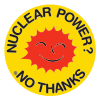
Back منطقة نيوزيلندا الخالية من الإشعاعات النووية Arabic Безъядерная Новая Зеландия Russian Yeni Zelanda nükleerden arındırılmış bölge Turkish
| Anti-nuclear movement |
|---|
 |
| By country |
| Lists |
In 1984, Prime Minister David Lange banned nuclear-powered or nuclear-armed ships from using New Zealand ports or entering New Zealand waters. Under the New Zealand Nuclear Free Zone, Disarmament, and Arms Control Act 1987,[1][2] territorial sea, land and airspace of New Zealand became nuclear-free zones. This has since remained a part of New Zealand's foreign policy.[3][4]
The act prohibits "entry into the internal waters of New Zealand 12 nautical miles (22.2 km, 13 13⁄16 statute miles) radius by any ship whose propulsion is wholly or partly dependent on nuclear power" and bans the dumping of radioactive waste into the sea within the nuclear-free zone, as well as prohibiting any New Zealand citizen or resident "to manufacture, acquire, possess, or have any control over any nuclear explosive device."[2][5] The nuclear-free zone Act does not prohibit nuclear power plants, nuclear research facilities, the use of radioactive isotopes, or other land-based nuclear activities.[6] However, no such research facilities or power plants exist currently in New Zealand.[7]
After the Disarmament and Arms Control Act was passed by the Lange-led Labour government, the United States government suspended its ANZUS obligations to New Zealand. The legislation was a milestone in New Zealand's development as a nation and seen as an important act of sovereignty, self-determination, and cultural identity.[8][9] New Zealand's four-decade anti-nuclear campaign is the only successful movement of its type in the world which resulted in the nation's nuclear-weapon-free zone status being enshrined in legislation.[10][11]
In 2021, Australia entered into AUKUS pact to get support in building nuclear submarines. In response, New Zealand's prime minister Jacinda Ardern announced that Australia's new submarines will be banned from entering New Zealand's long standing nuclear-free zone.[12]
- ^ New Zealand Nuclear Free Zone, Disarmament, and Arms Control Act 1987
- ^ a b "Nuclear Free Zone". canterbury.cyberplace.org.nz. Retrieved 12 April 2018.
- ^ Nicola Shepheard and Heather McCracken (29 March 2009). "Nuke ship ban queried". The New Zealand Herald. Retrieved 30 October 2011.
- ^ "New Zealand to join new nuclear disarmament treaty". The Beehive. Retrieved 25 May 2018.
- ^ New Zealand Nuclear Free Zone Extension Bill - Green Party Archived 30 June 2006 at the Wayback Machine
- ^ "Nuclear Energy Prospects in New Zealand". World Nuclear Association. April 2009. Retrieved 9 December 2009.
- ^ "Retail datasets". www.emi.ea.govt.nz. Electricity Market Information (EMI). Retrieved 20 January 2023.
- ^ "Lange's impact on NZ and world". BBC News. 14 August 2005. Retrieved 20 May 2010.
- ^ "Nuclear threat continues to grow, New Zealand warns on anniversary of anti-nuclear law". International Herald Tribune. 2007. Archived from the original on 18 May 2011. Retrieved 12 April 2018.
- ^ Lange, David (1990). Nuclear Free: The New Zealand Way. New Zealand: Penguin Books.
- ^ Temocin, Pinar (2021). "From Protest to Politics: The Effectiveness of Civil Society in shaping the Nuclear-free Policy in Aotearoa New Zealand". Commons Social Change Library.
- ^ Chidan, Rajghatta (16 September 2021). "US, UK to arm Australia with nuclear-powered submarines, sending ripples across world - Times of India". The Times of India. Retrieved 16 September 2021.
© MMXXIII Rich X Search. We shall prevail. All rights reserved. Rich X Search